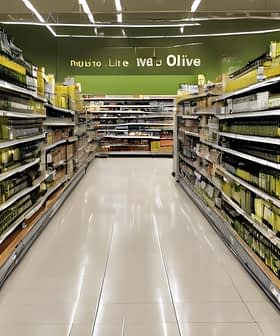More than one-quarter of the extra virgin olive oil sold by Deoleo in 2023 was sourced from olive farmers and mills following sustainable best practices, according to the company’s first integrated sustainability report.
“Sustainability is part of our strategy and our purpose,” Thierry Moyroud, Deoleo North America’s chief executive, told Olive Oil Times. “Our goal is to reach more than 70 percent of all our oils being sustainably sourced in the future.”
I’m more focused on how we can bring the beauty of our category into everyday use in all American kitchens… (Olive oil is) a product for the masses, not a product for the very few.
The report, audited by Deloitte, concluded that 27.7 percent of the company’s extra virgin olive oil comes from independently certified third-party farmers and millers following sustainable best practices.
The report also found that the world’s largest seller of branded olive oil, which includes the Bertolli and Carapelli brands, has eliminated the gender pay gap at the company and increased the number of bottles made from 100 percent recycled plastic by 7.4 percent.
See Also:Future Lies in Specialized, Sustainable Production, Deoleo CEO SaysMoyroud said the report had been in the works since the company undertook its first materiality assessment in 2020. It was published one year before the European Union said it would implement mandatory environmental, social and governance (ESG) reporting standards.
“It is our commitment to the category to be its stewards,” he said. “If we are to do that seriously, we think sustainability should be at the center of everything we do; it is a key piece of what should be expected from our industry.”

Thierry Moyroud
For Deoleo, sustainability includes minimal use of phytosanitary products in the olive groves, efficient use of water resources, promoting energy efficiency across the farming and milling processes, managing the soil as a living system, promoting biodiversity in the groves and minimizing waste during the production process.
“It’s a broad and holistic approach to identifying the parameters influencing the production of olive oil and the critical ones where we need to improve over time if we want to promote healthy and sustainable olive oil production,” Moyroud said.
While the company continues to lean into its sustainability strategy and marketing campaigns, Moyroud emphasized that quality comes first.
Like many in the sector, the last two years of poor harvests and rising production costs have been quite challenging for the Córdoba-based multinational, which sources extra virgin olive oil from Spain, Italy, Portugal, Tunisia, Greece and Argentina.
“What we are looking for is quality oil, first and foremost,” Moyroud said. “During some years, we can combine quality with sustainable sources; in other years, we have to prioritize quality.”
Another consequence of consecutive poor harvests in Spain and across the Mediterranean basin has been record-high prices at origin.
According to Infaoliva, extra virgin olive oil prices in Spain sit at €7.80 per kilogram at the time of writing, well below the mid-January record high of €8.988 but still 27 percent above the same time last year.
“If the last two years have taught me anything in this industry, it is to be very humble in our predictions and speculation because nobody expected what happened last year,” Moyroud said. “The market situation continues to be uncertain and complex.”
While prices fell substantially at the beginning of April, dropping to €7.00 per kilogram, with the news that Spain’s harvest exceeded initial expectations, they have continued to climb.
Even so, the country’s main olive-growing region looks promising, with a significant fruit set and an absence of the high temperatures that negatively impacted the two previous harvests in Andalusia.
“The first information we have about the new harvest is positive,” Moyroud confirmed. “The fruit blossoming is good. The water reserves are above average for this time of the year. These factors support a projection that the 2024/25 crop year will return to normal levels.”
In the five years before the historically poor 2022/23 crop year, Spain produced an average of 1.4 million tons of olive oil annually. Close sector observers believe this production level could result in prices dropping to between €3 and €4 per kilogram.
While Moyroud does not see the need to speculate about future prices, he thinks the past two years have been a wake-up call for the sector about the impacts of climate change in the Mediterranean basin, which is responsible for more than 95 percent of global olive oil production.
Similarly to Jaime Lillo, the International Olive Council’s executive director, Moyroud believes the sector’s future involves significant expansion in nontraditional olive-growing regions.
“[The two bad harvests and record high prices at origin are] a signal that the sector needs a profound transformation,” he said. “It’s a good signal being sent to the market that we need to rethink how we operate as an industry.”
Moyroud said Deoleo is working to expand its global approach to sourcing olive oil. He pointed to Argentina — already the largest producer outside of the Mediterranean basin — as a country with immense potential to expand high-quality extra virgin olive oil production. “Quality cannot be linked to any specific origin,” he added.
Moyroud said part of Deoleo’s success in a wide range of non-traditional olive oil markets is identifying taste profiles and consistently delivering extra virgin olive oil that meets these profiles, which often includes blending oils from different sources.
“For instance, in the U.S., people like much milder olive oil,” Moyroud said. “So, we define a taste profile for Bertolli in the U.S., which is not the taste profile for Bertolli in Germany.”
“To reach this taste profile, we sometimes use different blends to achieve the same result. That’s where we are strong,” he added. “To do that, it doesn’t matter where the olive oil comes from, but it matters what quality olive oil you can find.”
While ensuring a consistent and sustainably produced supply of extra virgin olive oil is one of Deoleo’s most pressing challenges, the other is increasing consumption in places such as the United States, which overtook Spain last year as the world’s second-largest consumer.
In his six years at the helm of Deoleo North America, Moyroud said the most significant change he has seen is the growth of the retail market in the U.S. since the onset of the Covid-19 pandemic in early 2020.
At the peak of lockdowns, an estimated 94 percent of the population was in a jurisdiction with mandatory stay-at-home orders in the U.S. Many were cooking at home and needed more cooking fat, including olive oil.
According to the United States Department of Agriculture, olive oil imports rose from 339,200 tons in 2019 to 402,600 tons in 2020, and this trend has continued. The U.S. imported an average of 322,150 tons annually from 2016 to 2019. In the four years since the pandemic started, this figure has risen to 387,575 tons.
See Also:U.S. Sees Significant Growth in Organic Olive Oil Sales“We retained a significant part of this increase,” Moyroud said. “The market has gone down since 2020, undoubtedly because people returned to restaurants. But at the end of the day, we have seen more penetration than before.”
“That is not the case in many geographies,” he added. “In many places, the market has returned to what it was before the pandemic.”
Moyroud believes the sector must capitalize on the pandemic’s cooking-at-home experience and expand olive oil’s share in the total edible oil category, which currently is about three percent.
“I’m more looking towards a place where olive oil will be center stage in the kitchen,” Moyroud said. “I don’t want to lean too much on the very high-end part of the olive oil category where we tend to look like the wine category. That’s a bit of an elitist approach.”
“I’m more focused on how we can bring the beauty of our category into everyday use in all American kitchens, which is not the case in many households today,” he added. “It’s a product for the masses, not a product for the very few.”
Returning to the significance of Deolo’s sustainability report, Moyroud said the sector must focus on educating the public about olive oil’s environmental benefits and health benefits compared to all other edible fats.
“Today’s conversations are about processed foods and how to eat less of them,” he said. “Tell me something less processed than olive oil. It’s very hard to find one, and we sometimes forget that.”
To that end, Moyroud plans to continue promoting olive oil as a healthy and conscientious alternative to other edible fats. He believes this will continue expanding Deoleo’s household penetration in the U.S., driving consumption.
“Very simply, we are at 55 percent penetration, so we still have 45 percent of households to reach,” he concluded.










